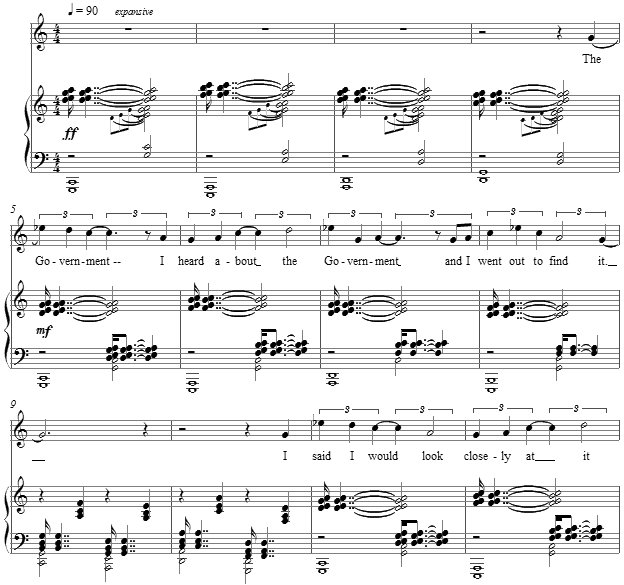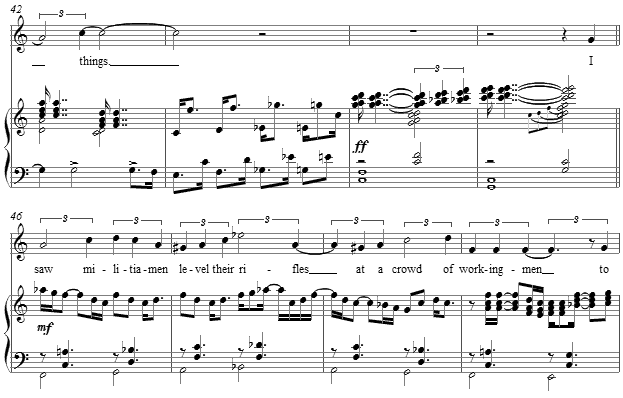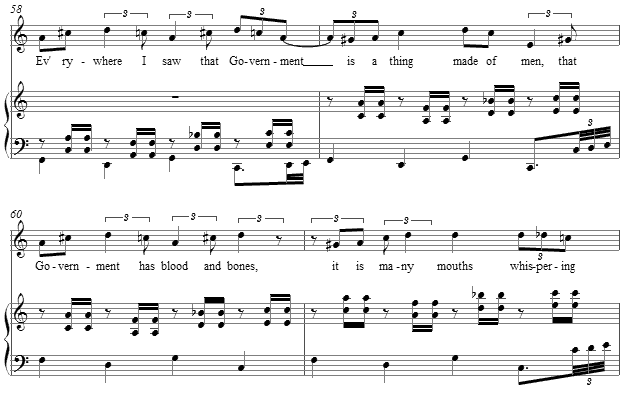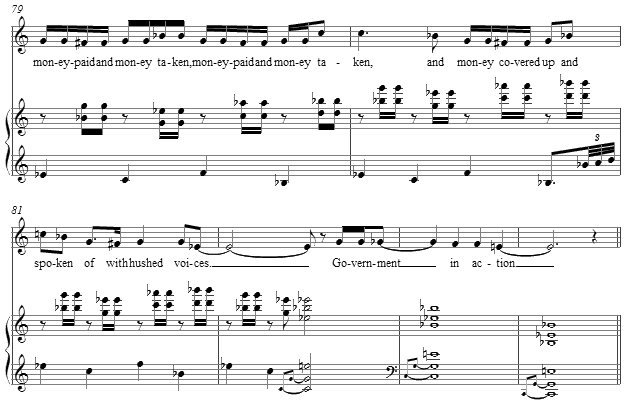Music and Texts of GARY BACHLUND
Vocal Music | Piano | Organ | Chamber Music | Orchestral | Articles and Commentary | Poems and Stories | Miscellany | FAQs
Government - (2008)
Carl Sandburg
for medium voice and piano
The Government--I heard about the Government and
I went out to find it. I said I would look closely at
it when I saw it.
Then I saw a policeman dragging a drunken man to
the callaboose. [ 1 ] It was the Government in action.
I saw a ward alderman [ 2 ] slip into an office one morning
and talk with a judge. Later in the day the judge
dismissed a case against a pickpocket who was a
live ward worker for the alderman. Again I saw
this was the Government, doing things.
I saw militiamen level their rifles at a crowd of workingmenwho were trying to get other workingmen
to stay away from a shop where there was a strike
on. Government in action.
Everywhere I saw that Government is a thing made of
men, that Government has blood and bones, it is
many mouths whispering into many ears, sending
telegrams, aiming rifles, writing orders, saying
"yes" and "no."
Government dies as the men who form it die and are laid
away in their graves and the new Government that
comes after is human, made of heartbeats of blood,
ambitions, lusts, and money running through it all,
money paid and money taken, and money covered
up and spoken of with hushed voices.
A Government is just as secret and mysterious and sensitiveas any human sinner carrying a load of germs,
traditions and corpuscles handed down from
fathers and mothers away back.
[ 8 pages, circa 5' 00" ]
Carl Sandburg
The so-called prose poem was popularized in the early twentieth century, and this is an outstanding example of it, though quite different that that of Walt Mason's rhyming Lions and Ants. In additional to the prose style, the content of Sandburg's poem is as pertinent to today as it was when it was written in 1916. (in Chicago Poems, (New York: Henry Holt and Company, pp. 173-74.) The skepticism for government has always been that an elite would use power in a corrupt and sometimes violent manner. One sees this as easily today as was seen in Sandburg's Chicago of 1916.
Such a sentiment has been echoed throughout time, and is not limited to this era. One might ponder Walt Whitman's most American advice to "resist!" He wrote clearly, "Once unquestioning obedience, once fully enslaved, no nation, state, city of this earth, ever afterward resumes its liberty." See To the States.
Also one could point to Richard Cobden, 19th century British "apostle of free trade," who wrote "Look not to the politicians; look to yourselves," and most pertinently, "Peace will come to Earth when the people have more to do with each other and governments less." To believe that government is the source of all answers is to ignore the history of governments and the injustices perpetrated in the name of government and politics.
Composed with most singers' tessitura in mind, the melodic line is notated in a 6/4 feeling over a standard dotted duple meter. The harmonic plan is utterly simple, utilizing the familiar I - vi - ii - V progression found in popular music with the vocal line reaching up to the minor third in an otherwise major tonality.
The poem does not fall into a regular scansion nor a set of well-defined stanzas or strophes, and yet the text fits itself through some judicious repetition into somewhat standard song form, the A section repeating twice, followed by bridge materials and a final repetition of the first "stanza." Below illustrates the second stanza's opening.
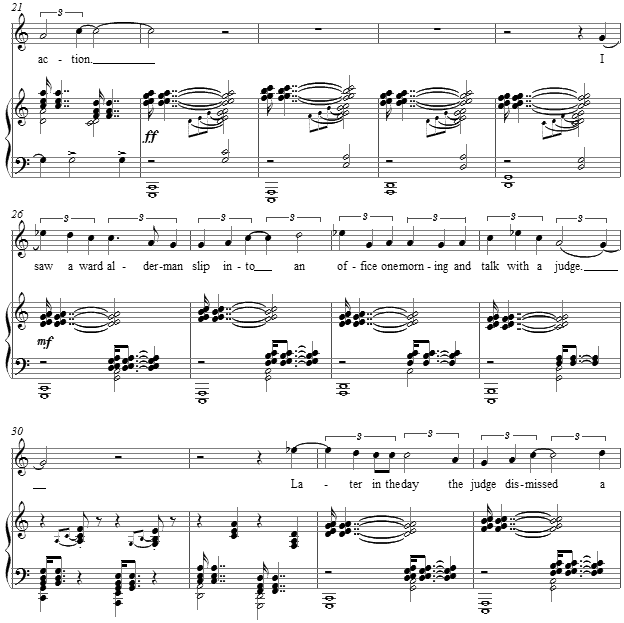
Being in C major with the flattened, "bluesy" third carried in the vocal line, the bridge materials are a modulation to the subdominant region wherein the piano accompaniment also shares in the major-minor harmonic scheme.
The text's declamation is accelerated from a 6/4 feeling in the first strophe to a 12/8 feeling, still in the subdominant. The harmonic rhythm's tempo also in accelerated based on the opening scheme's whole note duration to quarter notes.
With the mention of "money paid and money taken," vocal line becomes for only a moment a patter song of sixteenth notes, as the tonality slips one tone lower to E-flat major. The adage that "money is the mother's milk of politics" is as sadly apt now as it was in 1916.
The score for Government is available as a free PDF download, though any major commercial performance or recording of the work is prohibited without prior arrangement with the composer. Click on the graphic below for this piano-vocal score.
N O T E S
[ 1 ] The "callaboose" was the local jail jail, sometimes attributed to New Orleans slang. The word is found in “De Boatmen's Dance” (1843), music and lyrics by Dan Emmitt. In this period, many blackface performers in minstrel shows were Irish working-class men at a time when the Irish were not yet considered to be "white." The word is used written in a black dialect in "De Boatmen's Dance" as: "I wen on board de odder day / to see what de boatmen had to say; / dar I let my passions loose / an dey cram me in de callaboose." Similar black dialect, though deemed somehow offensive in the present day, can be found in some wonderful African-American poets, such as in Daniel Webster Davis' Hog Meat, and the fine poems of James Edwin Campbell's Echoes from the Cabin, whose words I have also set to music. The expression, callaboose, is therefore reminiscent of the lower classes in America of that period, European immigrant white as well as black. The more usual and popular spelling is "calaboose."
[ 2 ] A "ward alderman" is an elected representative to city council for a given electoral district. The term remains in use as it was in Chicago in the time of Sandburg, as in England and Wales until 1974, as well as Australia and Canada. The title is derived from the Anglo-Saxon position of ealdorman, literally meaning "elder man," and was used by the chief nobles presiding over shires, and the term remains in use in the city of Chicago today as well as elsewhere. American humorist, Ambrose Bierce, instructs us further in The Devil's Dictionary: ALDERMAN, n. An ingenious criminal who covers his secret thieving with a pretence of open marauding.

